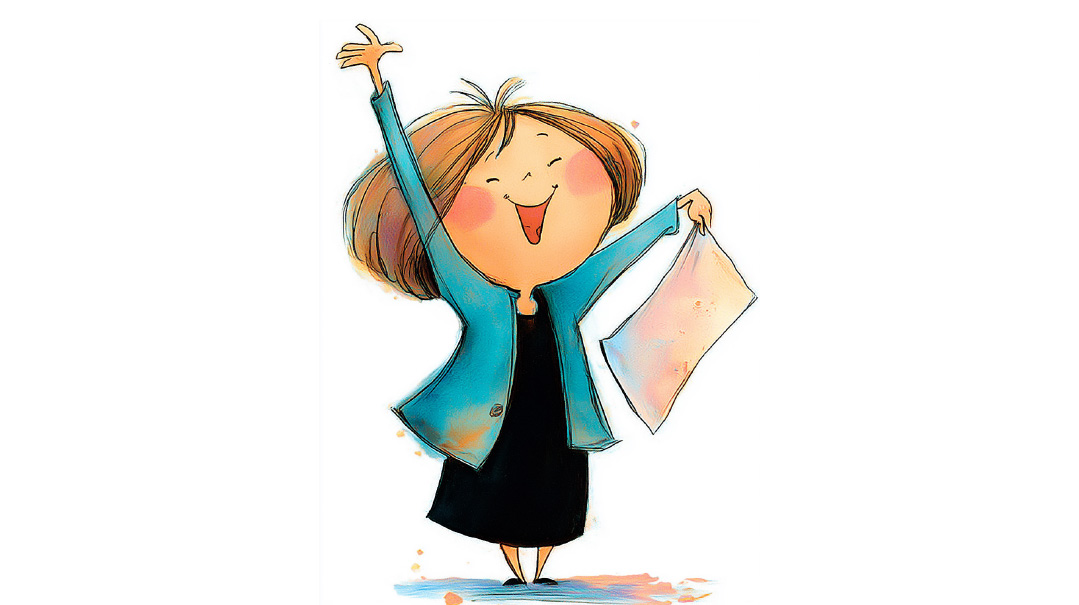Preparations

Rikki took a deep breath. “You may think I’m nuts, but I want to sit shivah in peace, not with a million-and-a-half small details on my head”

“I’m not quite sure where the simchah is these days. Feels more like having your wisdom teeth removed.” The florist listening to Rikki raised a horrified brow and fiddled with a rose stem.
“Really, who has time to think that soon my son ‘will be a man’? I’m too busy finding people to host my family for the Shabbos kiddush, and then I have to figure out hostess gifts, and also packages for the guests, because apparently people can’t live without water bottles and mints,” Rikki continued. The florist concentrated on the rose.
“And I’m going simple — but I’m still consumed by the details. And now I’m just wasting time, waiting for my mother, who’s supposed to help me pick out something nice.”
Now the florist gave a sympathetic smile.
“Did you have something in mind?” she asked tentatively.
Rikki appraised her. “I’ll be honest, I’m not looking to spend a lot, but I need something that doesn’t look like I got the cheapest thing, because they won’t look at me and think, ‘Wow, she’s so smart and economical, it’s a bar mitzvah, they’re nice flowers, who cares,’ they’ll think ‘Rikki’s being cheap again.’ ”
The florist blushed. “I’d suggest using a lot of greens then, they’re significantly cheaper, with a few flowers for a pop of color. What’s your color scheme?”
“It’s orange, my son loves orange. No, my dress is not orange. It’s black, of course,” Rikki told the florist. “Can you show me what you mean? I have no imagination.”
The florist scurried quickly between the buckets, putting together a sample centerpiece. Rikki tapped her foot and waited for her mother, who was so much better at these sorts of things. But her phone rang instead. It was her sister Sarah.
“Hi,” Rikki answered. “Have you spoken to Ma? ’Cuz she’s late to meeting me at the florist and isn’t answering her phone. You think she forgot to charge it again and it died?”
“Ummm, hi Rikki,” Sarah responded, then paused. “Ma’s in the hospital.”
Rikki sighed. Ma was always in and out of the hospital. She’d thought that today’s trip to the florist would be good for her. “What? I need to know if orange flowers with cheap green fluff are a good idea or not.”
A pause on the other end. “It’s not good.”
“But the flowers…”
“I’ll help you with them later.”
“But Ma has way better taste than you.”
“Rikki, just get to the hospital.”
If Sarah was exasperated with her already, it must be serious.
“Coming,” Rikki said, and hung up. “I have to run!” Rikki called to the florist. “I’m so sorry. I’ll be back.”
The florist waved feebly, but Rikki was already gone.
Both sisters were quiet as they looked at their mother.
“Tully’s bar mitzvah is in two weeks,” Rikki whispered to Sarah.
“So?” Sarah asked.
“This is not ending well — either Ma will be in the hospital and that’s all we’ll be able to think about, or we’ll have just gotten up from shivah and that’s all anyone will be able to talk about, or we’ll be in the middle of shivah and I don’t even know how that works.”
“How can you say that?”
“Say what? Which part? I never know which part of what I say offends people.”
“Everything. Everything you just said. Have a little faith, things will be okay.”
“They always are, right? But you heard the doctor.”
Sarah clutched the handles of her bag. “There’s always hope.”
Rikki exhaled and threw up her hands. “Can we talk straight here?”
Sarah looked at Rikki warily. “Let’s go for a walk.”
The walked silently through the halls, then down the elevator, out the lobby, and into the pedestrian garden that connected several hospital wings.
Rikki led Sarah to a bench and sat her down, while she stood and paced dramatically. “Ma’s been fighting for the past three years. The past six months have been a revolving door to this hospital. With the cancer and the complications, the doctors say there’s nothing to do but palliative care. I love my mother, but my Tully wants his bar mitzvah. So that’s why I’m worrying about it, even though my mother’s dying.” Rikki bit hard on her inner lip when she finished; her eyes felt watery. She glanced around, but there were no pollen-rich flowers to blame it on.
“She’s not dying,” Sarah stated, not meeting her sister’s eye.
“Sarah, did you hear the doctor? There’s emunah and then there’s denial.”
“You can’t say that.”
“Too late, I already did. You’re in the classic stages of grief — denial is first, then anger, bargaining, depression, then acceptance. I’m ten steps ahead of you — I’ve already made my peace. I need to figure this all out before Ma actually dies.”
“What do you mean, figure it all out?”
Rikki had taken out her phone and was tapping rapidly.
“I’m making a list of the things that have to get done before Ma dies and I can’t do them for a year — especially stuff related to the bar mitzvah.”
Sarah opened her mouth to protest, then was quiet. “This is really gonna mess with Tully’s bar mitzvah,” she agreed finally.
Rikki waved her off with a hand. “No, I decided that it’s fine. Now I can do whatever I want, because no one will remember anything other than Ma. I could use only baby’s breath as centerpieces, have Tully skip his pshetl — he’s so nervous, and no one will notice or remember.”
Sarah laughed. “I’ll never get how your mind works.”
“So help me with the list.” Rikki shoved her phone in front of Sarah’s face. “What am I missing?”
- Finish everything for bar mitzvah
- Cut hair
- Cut nails
- Shower
- Send in sheitel
- Listen to all my favorite songs
- Buy makeup
- Go to anyone’s wedding tonight
- Take care of playgroup registration
- Buy a bag
- Bring stuff to cleaners
- Go shopping for Shabbos
Sarah held up a hand. “This is depressing me.”
“You need to bargain first.”
“Very funny,” Sarah said. “Some of these things make sense but others… why can’t someone else do them. And playgroup registration — how’s that gonna work? They never allow early registration.”
“Yeah, but I don’t think I can register during shivah, and then what am I left with, no playgroup for my kid?”
Sarah laughed, then stopped herself.
“You’re allowed to laugh. Ma’s been dying for years.”
Sarah looked away.
Rikki took a deep breath. “You may think I’m nuts, but I want to sit shivah in peace, not with a million-and-a-half small details on my head.”
Sarah got up. “I took an Uber here, can you drive me home now?”
“Sure, but I have to make a few stops.”
“Can’t you drop me off first?”
“What’s your rush? First, let’s shop.”
Sarah got inside and closed the door with a bang. “I don’t need new clothes or stuff, I’ll be fine for the year.”
“Of course you’ll be fine, it’s a great excuse for you to look frumpy. ‘I can’t buy anything, I’m in aveilus, why my clothes are ten years out of style instead of just one, I don’t know.’ ”
Sarah laughed. Rikki pulled out of the parking lot.
“How dare you laugh, your mother’s dying.” Rikki’s eyes twinkled madly.
The two of them burst out laughing. The kind of laughter that feeds on itself and when you look at the other person laughing and by mistake meet her eyes, the laughter explodes, and the two of them were clutching their sides, howling, tears running down their cheeks, while somber-faced people tsked-tsked them in the hospital courtyard.
“Okay, enough, I have to get stuff done,” Rikki said sternly.
“What?”
Rikki shrugged, “Call the florist, tell her whatever she put together is beautiful and check that off my list, and then drop off my sheitel.”
Sarah just nodded.
“You?” Rikki prompted.
“Say Tehillim. Talk to my kids. That sorta stuff.”
Rikki pulled up to Sarah’s home. Sarah sat a moment longer before leaving, and Rikki grabbed her hand just as she exited. The two sisters met each other’s gaze, held hands for an extended second, then both released.
“Talk to you later,” Sarah said.
“Yeah, yeah,” Rikki said, pulling sunglasses down over her eyes. Sarah walked into her house; Rikki jerked the car into gear.
Later that night Rikki paced. Her mother was stable — for now — but the numbers weren’t good, the doctor had insisted when she'd called, as though wagging a finger in Rikki’s face forbidding her to hope. She was waiting for her husband Shua to come home with Tully, so she could pick up some groceries and then spend the night at the hospital.
Rikki wondered how she was supposed to tell her son that his grandmother was dying and that it was most likely to co-opt his bar mitzvah.
The door slammed, and Tully entered the kitchen. He looked at his mother. “What’s up?” he asked.
Rikki pulled out a seat for him. “Tully, sheifeleh,” she started confidently, then faltered.
“Who died?” he joked.
“No one. Yet,” Rikki said, happy he had given her an opening.
“Yet?”
“Bubby.” Rikki said simply.
“Oh.” There was a contemplative — or was it awkward? — silence, Rikki wasn’t sure. Then she broke in. “This might affect your bar mitzvah.”
“Oh,” Tully said again.
Rikki waited. Couldn’t he say something? Anything?
Tully pushed back his seat. “I’m going to my room,” he said, and left for the stairs.
Well, maybe not anything, Rikki amended her thoughts. Boys are so impossible, at least girls rage and cry.
Rikki puttered around the kitchen and then tiptoed to Tully’s door and listened. She thought she heard something like weeping. She hadn’t heard or seen Tully cry, really cry — not a-got-hit-in-the-shin-by-a-baseball-bat-cry but an emotional cry — in years. Was that what it sounded like?
The moment her husband entered the house she shooed him upstairs. “Go check on Tully. I told him, and he’s upset, maybe crying.”
He nodded and started up the stairs.
“Let me know how it goes,” she called after him. Rikki grabbed her purse and left.
She was just going to do a final food shop, make sure the house was well-stocked with easy snacks and meals to throw together while she was busy crying. And chocolate-covered almonds. A huge stash of them — they had to be Klein’s and not Schwartz’s, she knew the difference even though everyone else said she was crazy and that both companies got it from the same private-label distributor.
The beep beep as each item passed through the register was jarring. The tones were a little too similar to the heart monitor her mother wore, both lacking in consistent rhythm. Rikki bounced on the balls of her feet, her mind telepathically messaging the cashier, “Hurry up, hurry up.”
Her edginess surprised her. It’s not like she didn’t know what death was, her father had died four years ago, she knew exactly what she was getting into, there was no fear of the unknown, she knew her mother was dying and the time had finally come — so why was she itching to get out of her own skin?
Back in the car, with the groceries loaded in the trunk, Rikki took her phone out again. She glanced in her side-view mirror; the empty cart mocked her. She had left it there deliberately, she didn’t have time to put it back, her mother was dying and she needed to be at her side; besides, wasn’t that what those go-fetch parking lot employees were for? But maybe she should put it back, extend herself, as a zechus of sorts that her mother would live, at least a little longer.
Rikki frowned. You think your mother’s gonna live longer because you put the shopping cart back?
She huffed, then heaved herself out of the car and put the shopping cart in one of the return spots. She returned to her car and dialed Sarah.
“You ready?” she asked curtly.
“Yes.” In just one word, Sarah sounded small and defeated.
“Dropping off groceries, I’ll be by you in ten.”
Rikki rushed home, dumped all the groceries in the garage, honked so that her husband would know she had come and gone, and left for her sister’s house.
Sarah was waiting outside clutching a small overnight bag. She settled into her seat. Rikki drove off abruptly.
“How you doing?” Sarah asked Rikki.
Rikki shrugged, fingers gripping the wheel too tightly. “I think I’m upset, like angry, anxious type, I’m just not sure at what or who or why.”
Sarah gave her a weak smile. “Seems like you moved on from my denial — to your anger.”
Rikki let a small laugh, “But I’m over it, really I am,” she insisted.
“It ain’t over till it’s over,” Sarah said.
“Quoting Yogi Berra at a time like this — sacrilege.” Rikki chided as she reached to turn the music on.
The classic klezmer of “Chad Gadya” started, but was quickly interrupted by the ring of Rikki’s phone over the car speakers.
“Who’s calling, I don’t want to talk to you, I need my music,” Rikki grumbled before looking at caller ID. “Oh, it’s Shua, I wonder what happened with Tully?”
She pressed talk.
“Hi, honey,” Rikki answered. There was silence. “You there? You hear me? How’s Tully doing?” There was some shuffling something, or was is it sniffling, and breathing, neither sister could be sure. “Shua?” Rikki said one more time. She reached to disconnect the call.
“Rikki,” Shua’s voice finally gurgled. Rikki froze.
“What’s wrong?”
Silence.
“Shua, what happened?”
“The hospital called.”
Rikki made a short stop.
“No! Why didn’t they call me? I had my phone on. No, I’m not ready!”
Sarah was shivering and rocking in her seat.
Rikki glanced at her older sister, pulled the car over, reached over and hugged her.
“Couldn’t we just have had five more minutes? Couldn’t we have been there?” Sarah whispered.
The words came faster than her tears fell.
“And there’s your bargaining.”
Neither one of them laughed.
(Originally featured in Family First, Issue 599)
Oops! We could not locate your form.







